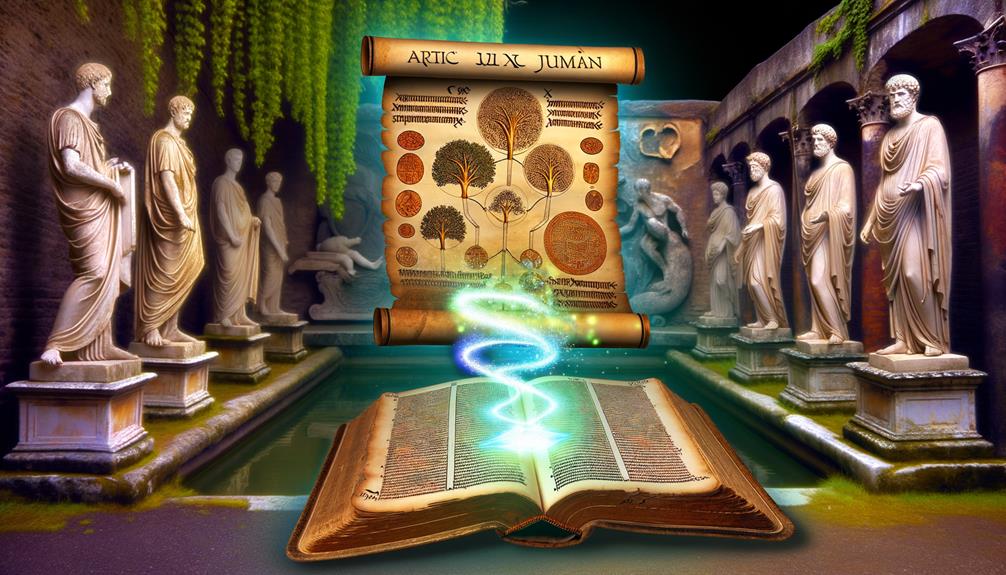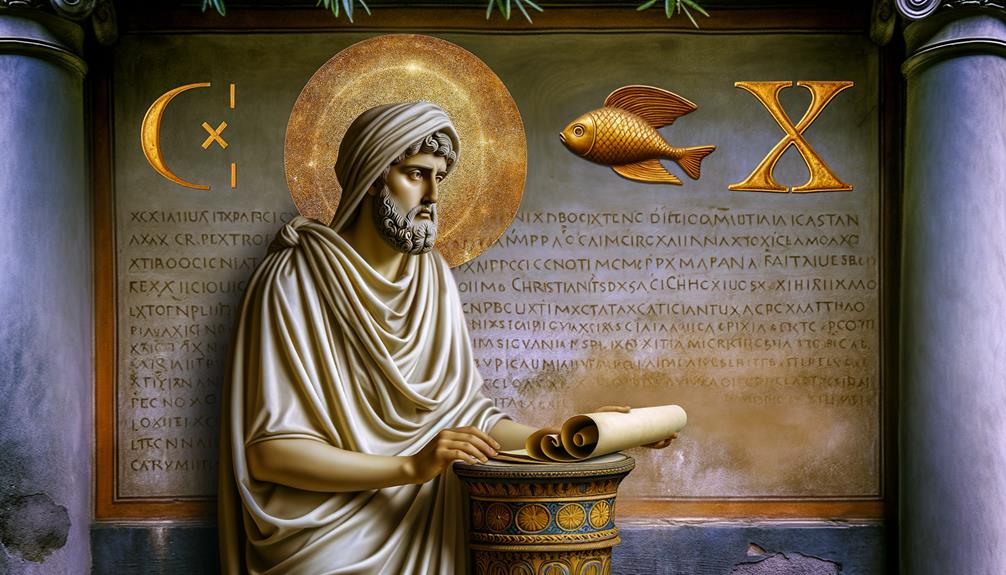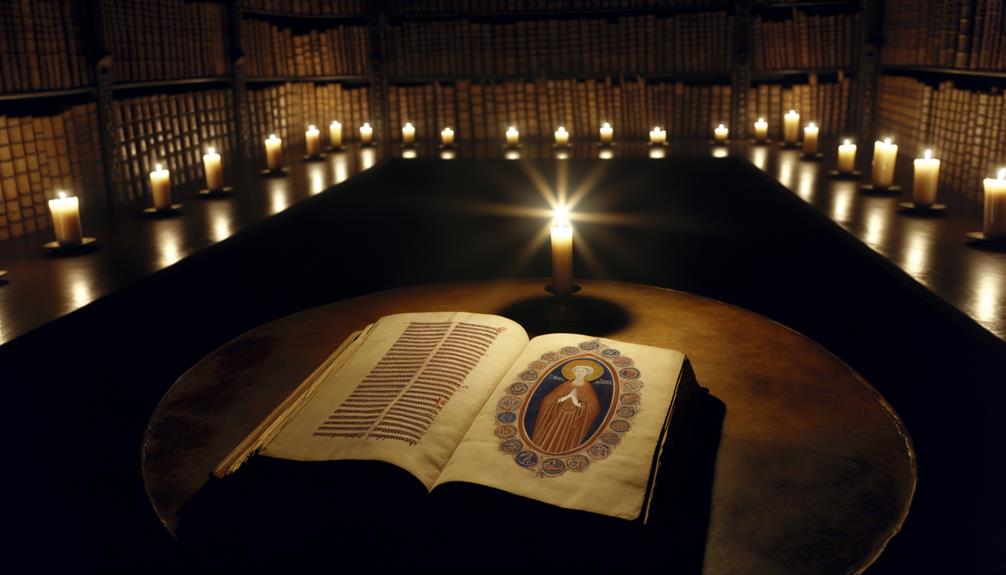Meaning of Julian in the Bible: Youthful and Devoted
The name Julian, derived from the Latin ‘Julianus’ and tied to the Roman family name Julius, signifies divine heritage and Christian virtues. While Julian is not directly mentioned in the Bible, it has rich historical significance intertwined with early Christianity.
Saints and martyrs named Julian, such as Julian of Antioch and Julian the Hospitaller, embody faith, resilience, and hospitality. Their stories highlight themes of sacrifice and divine grace.
Julian’s symbolic meaning includes youthfulness, divine favor, and hope, reflecting a spiritually vibrant connection to biblical principles. Exploring this name reveals profound insights into early Christian legacy and virtue.

Meaning of Julian in the Bible: Name Origin, Christian Context, and Symbolism
| Aspect | Details |
|---|---|
| Name Origin | Latin |
| Root Name | Julianus / Julius |
| Meaning | Youthful / Downy |
| Biblical Reference | Not directly mentioned in the Bible |
| Christian Context | Used among early Christians; linked to Saint Julian |
| Gender Association | Male |
| Symbolism | Youthfulness, renewal, early Christian heritage |
Origin of the Name Julian

The name Julian, derived from the Latin ‘Julianus,’ traces its roots back to the Roman family name Julius, which holds significant historical and cultural connotations.
The etymology of Julius is often associated with the deity Jupiter, suggesting a divine or exalted heritage. This nomenclature gained prominence through Julius Caesar, a pivotal figure in Roman history.
In theological contexts, names carry profound implications, often embodying attributes of character and destiny. The adoption of Roman names into Christian traditions signifies a cultural synthesis, wherein classical heritage intersects with biblical narratives.
Julian in Early Christianity

Building upon the cultural synthesis of Roman nomenclature and Christian traditions, Julian’s significance in early Christianity is exemplified through various historical figures and saints who bore the name, reflecting its spiritual and communal resonance within the nascent Church.
The name Julian, derived from the Latin ‘Julianus,’ encapsulates a heritage of devotion and piety, as illustrated in early Christian texts and martyrdom accounts. This nomenclature’s adoption within the Christian community underscores the integration of Roman cultural elements into the burgeoning faith.
Julian’s etymological roots, meaning ‘youthful’ or ‘vivacious,’ symbolically aligned with the Church’s mission to renew and invigorate spiritual life. Accordingly, Julian became more than a name; it embodied the transformative zeal of early Christian witness.
Historical Figures Named Julian

The name Julian has been borne by several notable historical figures, each influencing Christian thought and history in unique ways.
Julian the Apostate, known for his attempts to restore paganism in the Roman Empire, contrasts sharply with the mystical revelations of Julian of Norwich, whose theological insights continue to inspire.
Additionally, Emperor Julian’s reforms offer a critical lens through which to examine the complex interplay between religious authority and imperial policy in late antiquity.
Julian the Apostate
Known for his staunch opposition to Christianity, Julian the Apostate, the Roman Emperor from 361 to 363 AD, sought to revive pagan religions and diminish the influence of the Church. His reign symbolizes a critical moment of theological conflict, as he endeavored to restore Roman polytheism amidst the empire’s growing Christian community.
Julian’s actions included:
- Rebuilding Pagan Temples: A direct affront to Christian worship sites.
- Reviving Hellenistic Traditions: Reinforcing ancient religious practices.
- Reinstituting Pagan Priesthoods: Undermining ecclesiastical authority.
- Implementing Anti-Christian Policies: Curtailing Christian privileges.
Julian’s brief but impactful reign underscores the enduring struggle between paganism and Christianity, reflecting a period of profound religious transformation within the Roman Empire.
Julian of Norwich
Revered for her mystical writings and profound theological insights, Julian of Norwich stands as a pivotal figure in Christian spirituality. Living in the 14th century, she is best known for her visionary work, ‘Revelations of Divine Love.’
Julian’s contemplative reflections on God’s love and the Passion of Christ profoundly influence Christian thought. Her assertion that ‘All shall be well, and all shall be well, and all manner of things shall be well’ encapsulates her deep trust in divine providence.
Julian’s theology harmonizes with Scripture, particularly with themes found in the Psalms and the Gospel of John, emphasizing God’s intimate and unconditional love for humanity. Her legacy continues to inspire and offer spiritual solace to many believers.
Emperor Julian’s Reforms
While Julian of Norwich’s theological insights provide profound spiritual guidance, Emperor Julian’s reforms mark a significant historical endeavor to revive pagan traditions and diminish the influence of Christianity within the Roman Empire. Known as Julian the Apostate, his policies sought to restore classical Roman and Hellenistic religious practices.
His efforts included:
- Reopening Pagan Temples: Julian reversed the Christian closure of pagan worship sites, rekindling ancient rites.
- Educational Reforms: He mandated a return to classical texts, hoping to root out Christian influence in education.
- Administrative Changes: He reinstated traditional pagan priesthoods, aiming to strengthen state-sponsored paganism.
- Economic Incentives: Julian financially supported pagan communities while restricting Christian privileges.
These measures reveal a complex interplay of religious, cultural, and political motives, reflecting Julian’s determined yet ultimately unsuccessful campaign against the entrenched Christian establishment.
Julianus: The Latin Connection

Rooted in Latin origins, the name Julianus carries significant cultural and historical weight, reflecting a rich tapestry of linguistic and theological tradition. In Latin, Julianus is derived from ‘Iulianus,’ a name associated with the gens Julia, one of ancient Rome’s most distinguished families. This connection imbues the name with connotations of nobility and leadership.
Theologically, Julianus may not explicitly appear in Biblical scripture, yet its linguistic ties evoke themes of divine favor and grace, drawing parallels to the Christian virtues of humility and service. Understanding Julianus through its Latin heritage enriches our appreciation of its nuanced meanings, bridging classical antiquity with the spiritual ethos that permeates Biblical narratives.
This depth underscores the enduring relevance of names in theological discourse.
Biblical Names With Similar Meanings

In examining Biblical names with similar meanings to Julian, one can uncover a tapestry of etymological connections and theological implications that reflect themes of divine grace, favor, and leadership. These names transcend mere labels, embodying profound spiritual truths and divine attributes.
- Jonathan – Meaning ‘Yahweh has given,’ this name emphasizes the divine act of bestowing grace and favor.
- David – Interpreted as ‘beloved,’ it signifies God’s chosen leader and the intimate relationship between God and His anointed.
- Nathaniel – Translating to ‘God has given,’ this name highlights the divine origin of gifts and blessings.
- Theodore – Meaning ‘gift of God,’ it encapsulates the idea of divine benevolence and providence.
Each name, steeped in scriptural significance, invites deeper reflection on God’s unending grace.
Saints and Martyrs Named Julian

The name Julian holds a significant place within early Christian history, particularly through the lives of saints and martyrs who bore this name.
Among them, Saint Julian of Antioch and Saint Julian the Hospitaller stand out, symbolizing the virtues of faith and hospitality.
Their veneration underscores the enduring legacy of Julian as a name synonymous with steadfast devotion and sacrificial love in the Christian tradition.
Early Christian Martyrs Julian
Among the numerous saints and martyrs named Julian, their stories reflect the profound resilience and unwavering faith characteristic of early Christian testimony.
These martyrs serve as beacons of divine fortitude, each narrative underscoring the sanctity of their commitment to Christ. Their tales are imbued with theological significance, mirroring scriptural themes of sacrifice and redemption.
- Julian of Antioch: Endured brutal persecution under Emperor Diocletian, ultimately embracing martyrdom with steadfast devotion.
- Julian of Tarsus: Suffered grievous tortures for his unwavering Christian faith, symbolizing the triumph of spirit over corporeal suffering.
- Julian of Emesa: His martyrdom during the Decian persecution exemplifies the early Church’s struggle and perseverance.
- Julian of Sora: His sacrifice embodies the scriptural call to bear witness to the Gospel unto death.
These stories inspire profound reverence and reflection.
Veneration of Saint Julian
Veneration of Saint Julian, encompassing various saints and martyrs bearing the name, reflects the enduring legacy of their holy sacrifices and the profound impact on Christian liturgical traditions.
Diverse in their origins and eras, these saints symbolize faith, resilience, and devotion. Julian of Antioch, for instance, is celebrated for his martyrdom during Diocletian’s persecution, while Julian the Hospitaller is revered for his acts of charity and hospitality.
| Saint Julian | Era | Significant Acts |
|---|---|---|
| Julian of Antioch | 4th Century | Martyrdom during Diocletian’s reign |
| Julian the Hospitaller | Middle Ages | Known for charity and hospitality |
| Julian of Le Mans | 1st Century | Early missionary work in Gaul |
These figures embody the spiritual fervor and unwavering commitment to Christian values.
Julian’s Symbolic Significance

Rooted in its Latin origin, the name Julian holds a profound symbolic significance within biblical texts, often associated with themes of youth, liveliness, and divine favor. This name carries a rich tapestry of meanings that evoke spiritual reflection and emotional resonance among believers.
Its symbolic attributes can be understood through:
- Youthfulness: Julian symbolizes a perpetual state of spiritual renewal and innocence.
- Liveliness: The name embodies the vivacious spirit and dynamic faith celebrated in scripture.
- Divine Favor: It signifies being blessed and chosen by God, reflecting a special relationship with the divine.
- Hope: Julian represents an optimistic outlook and trust in God’s providence.
Understanding these themes helps to deepen one’s spiritual journey and connection to biblical teachings.
Julian in Christian Literature

In Christian literature, Julian is often referenced both historically and symbolically, reflecting a nuanced understanding of its biblical significance.
Historical references to Julian frequently highlight its association with early Christian saints and scholars, contextualizing its importance within the faith tradition.
Symbolically, Julian embodies themes of divine grace and steadfast faith, resonating deeply within the broader tapestry of Christian theology.
Historical References to Julian
Throughout Christian literature, the name Julian often appears in hagiographies and ecclesiastical histories, underscoring its significant historical and theological resonance. Julian is frequently associated with figures of profound faith and enduring influence.
For instance, St. Julian of Antioch is celebrated for his martyrdom, symbolizing steadfast devotion. Similarly, Julian the Apostate, though a controversial figure, profoundly impacted early Christian apologetics and theological discourse.
These historical references evoke a tapestry of emotional and spiritual responses:
- Reverence: St. Julian’s martyrdom inspires deep spiritual reverence.
- Controversy: Julian the Apostate’s opposition evokes complex theological debates.
- Legacy: The enduring legacies of these figures shape Christian thought.
- Faith: The name symbolizes unwavering faith amidst trials.
Thus, the name Julian encapsulates diverse historical narratives within Christian literature.
Julian’s Symbolic Significance
The name Julian, rich with theological nuance, serves as a profound symbol of the multifaceted dimensions of faith, conflict, and legacy within Christian literature.
Historically associated with Julian the Apostate, it evokes themes of apostasy, divine judgment, and the enduring struggle between orthodoxy and heresy.
In patristic writings, Julian’s rejection of Christianity is metaphorically interpreted as a cautionary tale against spiritual rebellion.
This symbolic representation is not merely historical but also eschatological, reflecting the continuous battle against forces that seek to undermine divine truth.
Consequently, Julian’s narrative becomes a theological touchstone, urging believers to steadfastness and vigilance in their faith journey.
His story underscores the perpetual relevance of doctrinal fidelity within the Christian tradition.
Modern Christian Use of Julian

Although ancient in origin, the name Julian has found renewed significance among modern Christians, often symbolizing a blend of historical reverence and contemporary faith. This resurgence can be attributed to the name’s association with early Christian martyrs and saints, as well as its timeless appeal.
Modern Christians often choose the name Julian for its:
- Historical Depth: Rooted in the early church, Julian evokes a sense of continuity with the past.
- Scriptural Resonance: Though not explicitly mentioned in the Bible, it carries an aura of biblical sanctity.
- Universal Appeal: Its usage transcends cultural boundaries, uniting Christians worldwide.
- Spiritual Inspiration: It serves as a reminder of the virtues and steadfastness of early Christian figures.
This contemporary embrace reflects a dynamic interplay between tradition and modernity.
Spiritual Implications of Julian

Intrinsically woven into the fabric of Christian spirituality, the name Julian invites contemplation on the virtues of perseverance, faith, and divine grace.
Rooted in the Latin ‘Julianus,’ meaning ‘youthful’ or ‘devoted to Jove,’ its spiritual implications extend beyond etymology.
Julian symbolizes an enduring faith journey, echoing biblical themes of unwavering trust in God despite trials.
The name encourages believers to embody resilience akin to scriptural figures like Job, who exemplified steadfast faith.
Julian also resonates with the divine grace bestowed upon believers, reminding them of God’s unmerited favor.
This theological richness calls Christians to reflect on their spiritual walk, encouraging a deeper, more resilient faith marked by perseverance and grace.
Conclusion
The name Julian, deeply rooted in early Christianity and intertwined with historical figures, carries significant theological weight.
Its Latin origins and symbolic resonance with other biblical names amplify its spiritual implications.
Julian’s presence in Christian literature and its modern use highlight an enduring legacy.
The intricate connections and profound meanings surrounding Julian beckon further exploration, inviting scholars and believers alike to investigate deeper into its sacred significance, revealing layers of divine mystery and historical richness.






